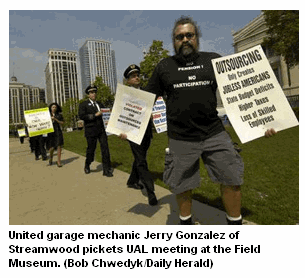Source: Associated Press
Author: Dave Carpenter

CHICAGO - UAL Corp. Chairman and CEO Glenn Tilton touted the once-bankrupt company's revival Thursday at the first shareholder meeting since 2002 for United Airlines' parent, but was partially upstaged by employees angry about executive pay.
Hundreds of pilots, flight attendants and other uniformed employees demonstrated outside the meeting and some inside challenged Tilton over what they see as excessive pay for the company's top managers and a shortage of personnel.
"Employee morale is at an all-time low," said pilot Margaret Freeman, a 767 captain and 18-year veteran of United. "Your employees are no longer behind you" -- a remark that drew loud applause from some of her co-workers.
Tilton, who oversaw the three-year bankruptcy restructuring that made United a smaller, more cost-effective airline, said employee morale matters but pointed to the airline's financial success and comeback from the brink of liquidation as a higher priority.
"We care also ... that at the end of the day this is a sustainable enterprise," he said. "Bankruptcy is bad for employee morale. Failure is bad for employee morale."
UAL lost more than $10 billion from 2000 until last year, when it returned to profitability with gains in the second and third quarters. It has since posted losses in each of the last two quarters, pressured along with other U.S. carriers by lower U.S. passenger demand.
Tilton lauded United's shift to "a much stronger and more competitive company" and one that is taking a number of steps to improve profitability and performance.
"We have pulled ourselves up and out of a crisis that threatened the very existence of our company, and for which we and all other U.S. carriers were very ill-prepared," he told the roughly 100 shareholders in attendance. "Our company has made progress in recent years, finding our solutions to problems that others thought were insoluble, and opportunity for our company lies ahead."
The airline's unions, however, remain upset about the tens of millions of dollars of stock and option awards granted to top United executives last year after employees took substantial pay cuts in bankruptcy. Tilton received compensation worth $39.7 million in 2006.
Walking back and forth in front of the Field Museum, where the meeting took place, pilots and flight attendants carried signs with such messages as "Management Feeds from the Trough, Labor Gets the Scraps," and "UAL CEO: $40 million. Labor: $0. THIS Is Sharing?"
"We're trying to bring attention to what we see as an issue of fairness and equity," said pilots' union spokesman Herb Hunter. "We got through this (restructuring) on shared sacrifice. Well, shared sacrifice obviously doesn't translate to shared reward."
Tilton said the company embraces a pay-for-performance philosophy and recommended that those complaining about executive pay read its proxy statement to understand its reasoning. He said 2006 compensation totals were inflated by a "one-time event" resulting from awards made under the company's long-term equity incentive program.
He also referred to those protesting as a "vocal minority."
Asked about the risk of personnel shortages and a disruption to flight schedules this summer, Tilton said the company will make sure it is adequately staffed. "We are going to make certain that this airline works," he said.
The pilots' and flight attendants' unions also were hoping to wield their influence at the meeting, urging their members who hold UAL stock to oppose the company's nominees for the board of directors. But the company said all its nominees were elected. No vote totals were given.
United isn't the only airline whose employees are upset about executive pay after years of forced sacrifices. Labor-management tensions also have risen at American Airlines, the largest U.S. carrier, where employees were enraged by stock bonuses given to about 900 managers last month.
Its current labor contracts extend through 2009.
Shares in UAL fell 64 cents, or 1.8 percent, to $34.61 in Thursday trading.